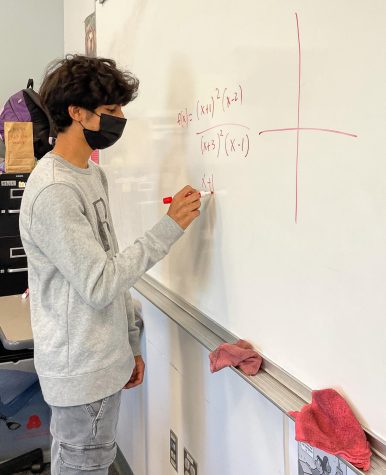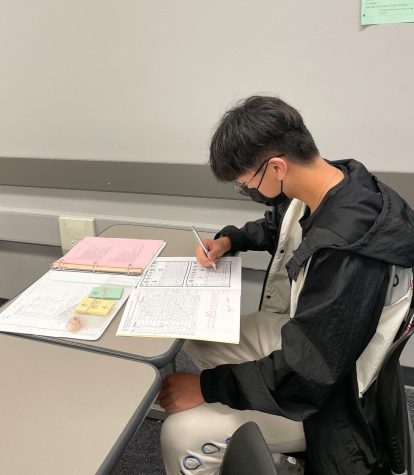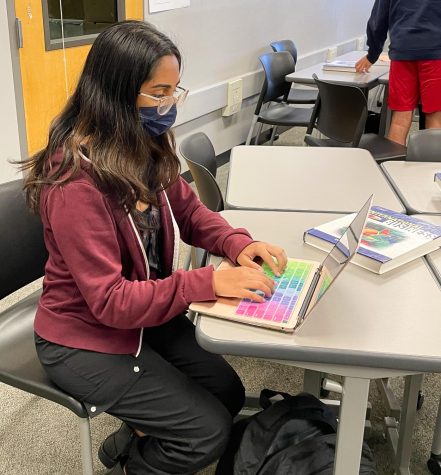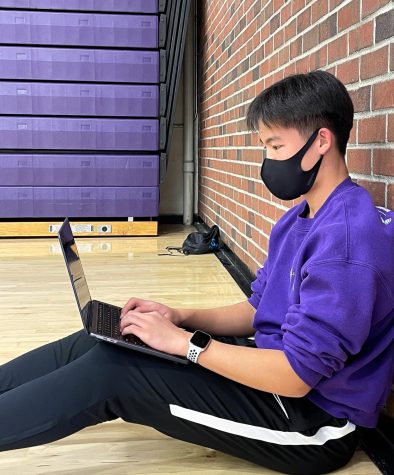Brain drain
Students share which classes they find the most difficult
October 2, 2022
Amish Tyagi
Freshman Amish Tyagi is taking Pre Calculus Honors, a class that is intended for upperclassmen or sophomores. Tyagi says that even though he is one of the few freshmen in his accelerated math class, he believes he chose the right class to take as he says he is learning a lot.

Although math isn’t Tyagi’s favorite subject, his reasoning for taking such an accelerated class is to help him achieve a higher understanding of his intended major, which is computer science, as the two subjects are interconnected.
“I’ve always known that I want to be a CS major because I’ve been coding since I was seven or eight,” Tyagi said. “It was something I wanted to do after seeing my mom code late at night because I was always a late sleeper [growing up].”
As Tyagi’s love for coding grew, so did his parents’ expectations. Tyagi believes that the expectations his parents set for him are reasonable, but he can still sometimes get a little stressed when trying to meet them.
The pressure from his parents also stems from living in the Bay Area, which Tyagi believes is both a blessing and a curse. Tyagi feels pressure not just from his parents, but also from himself, to take rigorous courses such as Pre Calculus Honors. However, Tyagi says that because the academic culture is so STEM-oriented, he is able to set higher goals to work towards due to the opportunities the community provides.
“Being in the Bay Area, I see a lot of potential for my career path,” Tyagi said. “That makes me look forward to the future, knowing that there’s a lot of opportunities [for CS majors] out there.”
Hyonjin Kim
Although he is taking AP Calculus BC, AP Computer Science A and AP Physics 1, all stereotypically challenging classes, sophomore Hyonjin Kim shares that Chinese 3 is the hardest class he’s taking this year. Kim finds Chinese 3 difficult not because of the material covered in the class, but rather because he’s uninterested in the subject.

Kim explains that he has been “indirectly pressured by [the Cupertino Community] to take higher-level STEM courses,” so he’s been “conditioned to enjoy those classes more than others.”
Kim says that in general, his liberal arts classes are what he struggles with the most, as he isn’t as familiar with the material, so he has to pay more attention in those classes for fear of falling behind.
Not to mention, Kim says that he feels slightly out of place as his Chinese 3 class consists mostly of freshmen, which makes him feel as if he should be with “all of the other sophomores” in Chinese 4 Honors.
Despite feeling slightly out of place, Kim says that his teacher, I-Chu Chang, has made the class a lot more enjoyable than it otherwise would be, as she provides everyone — regardless of their Chinese background and skill level — with an engaging class.
“I would recommend [taking any Chinese course at MVHS], because both of the teachers, I-Chu Chang and Zoey Liu, are really good teachers,” Kim said. “No matter if you like learning Chinese or not, [their classes] are very engaging.”
Smriti Rangarajan
Junior Smriti Rangarajan says she wants to be either a finance or computer science major, but that doesn’t stop her from studying subjects related to life science. This year, Rangarajan is taking AP Biology, which she says is her most difficult class.
Rangarajan said she chose to take AP Biology because she wanted to try something new, and also because she believed the material she learned in Chemistry Honors last year would be useful for AP Biology. Rangarajan says that while the class has a heavy workload, especially with note-taking, she likes that it’s a very hands-on class.

“I would say [AP Biology] is very interesting because we do more labs,” Rangarajan said. “[Especially because] my freshman year [of Biology] was online, so I didn’t get to do the pig dissection or any of the [labs] in person.”
Besides enjoying the labs, Rangarajan also appreciates how her teacher, Renee Fallon, makes the class engaging. She notes how Fallon often tells the class personal stories that better their understanding of the complicated topics that they are learning.
“[Ms. Fallon] is very enthusiastic,” Rangarajan said. “When she’s teaching, she’s super animated and gives a lot of examples. She’s always very approachable in case you have any questions.”
Rangarajan believes she has chosen the right class for herself, as she is able to learn a lot while not being completely overwhelmed. Although she says choosing what class to take can be difficult, Rangarajan says that it’s crucial to keep in mind personal limits.
“We all have different versions of what’s hard for us and what’s easy for someone else,” Rangarajan said. “So definitely don’t be afraid to push yourself, but also recognize that if you really don’t feel passionate about something, don’t feel the need to take a harder class for it.”
Dillon Huang
After taking Honors American Literature last year, senior Dillon Huang decided to challenge himself and take AP Literature, which he believes is the hardest class he’s currently taking.
“Last year, we had five or six classes of Honors American Literature and I think only half of those [people] are taking AP Literature right now,” Huang said.

Huang says the number of people who chose not to take AP Literature is due to “the time crunch on tests and the higher requirements for the quality of writing and analysis,” which Huang finds time-consuming. However, Huang finds AP Literature enjoyable as a whole, and he believes Literature teacher Jireh Tanabe, his freshman and sophomore literature teacher, is partially responsible for this.
“Ms. Tanabe prepared me for my future classes because there was also a high demand of writing and quality [in her class],” Huang says. “So I think it was similar to the expectations of AP Literature and it helped me be able to be more critical of myself when I write and revise.”
Huang wants to go into a STEM-related major, but finds that he actually enjoys his non-STEM classes more. However, Huang finds that he can apply a lot of the skills he learns in his non-STEM classes to what he might major in, such as financial engineering.
“I think a lot of the humanities [classes] are the fundamentals of becoming a STEM major,” Huang said. “[Not only because] they’re general classes, but also because the writing skills you refine in those classes you need in order to apply them in lab reports or analysis.”
